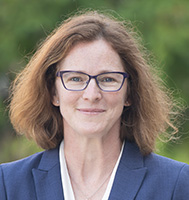Q&A with Jesse Boyett Anderson, MD, MS, assistant professor, Division of Cardiology
 Hometown: I grew up on both coasts (California, Oregon, Georgia, and Rhode Island) and now consider Middleton, Wisconsin, my home.
Hometown: I grew up on both coasts (California, Oregon, Georgia, and Rhode Island) and now consider Middleton, Wisconsin, my home.
Educational/professional background: I earned my BS and MS in biological sciences from Stanford University and spent a decade in higher education and science writing. I then completed medical school, pediatrics residency, and pediatric cardiology fellowship at the University of Wisconsin in Madison, Wisconsin.
Previous position: Pediatric Cardiology Fellow, University of Wisconsin
What is your field of research or area of clinical care, and how did you get into it? I care for children with heart defects and other cardiac concerns. Having a cardiac problem during childhood can impact many aspects of a child’s development. Some children who have heart surgery as babies are slow to learn to eat or walk. Others may struggle with attention span or organizational skills in school or may encounter mental health challenges later in life. When these challenges are identified early, we can provide treatments, therapies, and support to help children reach their full potential. I study how to best connect children with resources that can help them overcome the challenges related to their cardiac problems.
How would you describe your work to a 5-year-old? I take care of babies’ hearts and kids’ hearts so they can grow up strong and healthy!
What attracted you to UW-Madison? I moved to Madison for the welcoming people, the family-friendly culture, and the gorgeous landscape. I stayed because of the growth mindset and collegiality of the members of the Heart Program at UW Health Kids coupled with our good outcomes.
What is your favorite thing to do in Madison? I love spending time outside: whether it is kayaking in the Pheasant Branch Conservancy, hiking at Indian Lake County Park, connecting with friends at the Westside Community Farmer’s Market, or visiting Art Fair on the Square.
What’s one thing you hope trainees will learn from you and your work? I hope trainees will come to recognize the value of partnering with parents and other caregivers to optimize child health and development. While we may be experts at managing disease states, caregivers are experts on their children. We provide better care when we work together.
Do you feel your work relates to the Wisconsin Idea? If so, please describe how. I partner with families, physicians, and hospitals to care for children across the state of Wisconsin and train others to do the same.
What’s something interesting about your area of expertise you can share that will make us sound smarter during video chats and parties? The brains of babies with some complex heart defects develop slower than the brains of babies without heart defects. A baby born on time with one of these heart defects (hypoplastic left heart syndrome and D-transposition of the great arteries) has a brain that looks and functions like a baby that was born a month premature. These early differences in brain development have both short- and long-term implications for the baby’s care and their future development.
What are some of your hobbies and other interests? In addition to spending time outside with my family, I enjoy reading speculative fiction and cooking food from my garden.